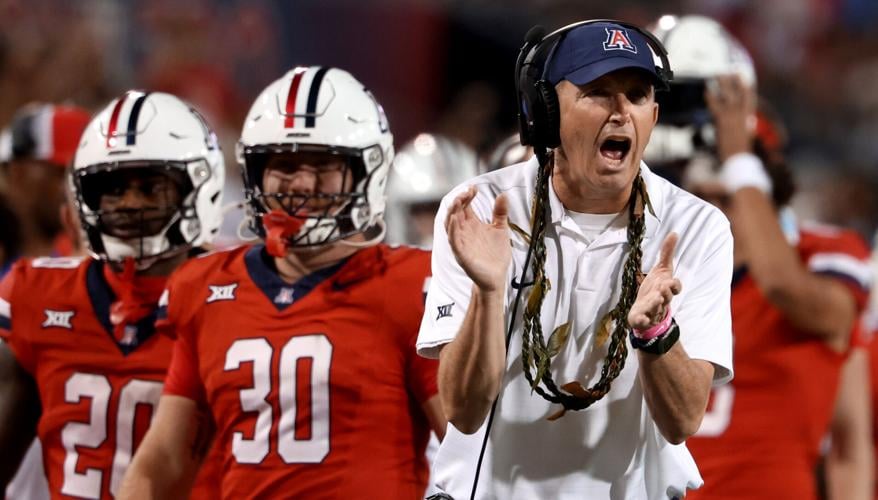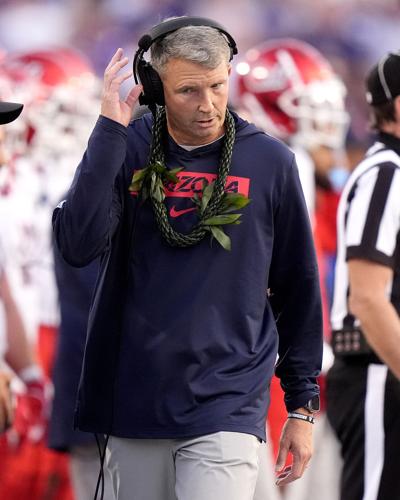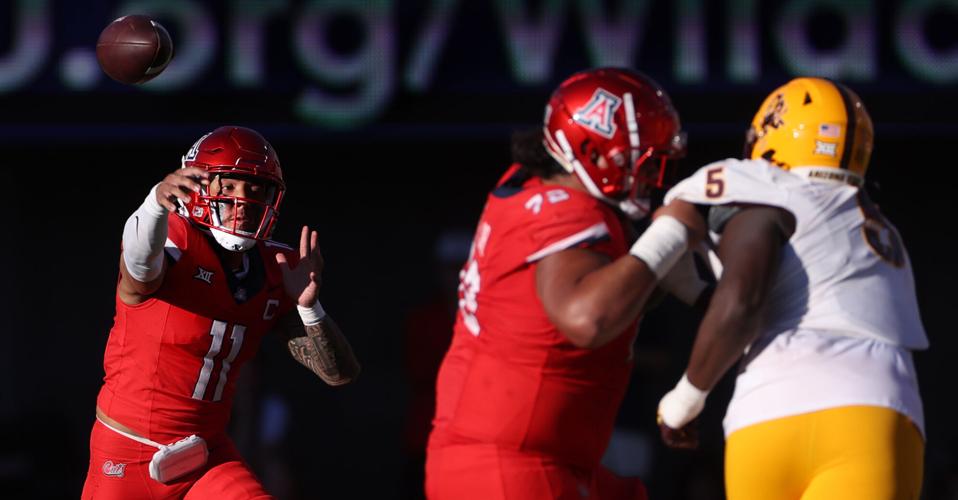How did it get this bad? Where did everything go wrong for Arizona football?
How did Arizona go from a rising program and College Football Playoff hopeful to 4-8 and a murky future?
The short and easy answer: Nick Saban retired from his post at Alabama to sit next to Pat McAfee every Saturday morning for three hours on ESPN. The impact of Saban's retirement trickled down to UCLA needing a new tight ends coach.
The long and complicated answer to Arizona's rocky first season under first-year head coach Brent Brennan has several layers.

Arizona coach Brent Brennan has some encouragement for the offensive unit after the Wildcats put together a scoring drive in the third quarter against West Virginia on Oct. 25, 2024, at Arizona Stadium.
When Brennan was asked about the most challenging part of the season following Arizona's loss to TCU that took the Wildcats out of bowl contention, the Arizona coach bluntly said, "the injuries." And there were plenty of them.
Three defensive captains — linebacker Jacob Manu, safety Gunner Maldonado and nickel back Treydan Stukes — suffered season-ending leg injuries. Preseason All-Big 12 cornerback Tacario Davis dealt with a nagging groin injury throughout the season. Senior nose tackle Chubba Ma'ae only played in four games due to a leg injury, albeit he could return in 2025 with a medical redshirt. Memphis transfer defensive lineman Jarra Anderson was held out all season with a leg injury.
Starting left tackle Rhino Tapa'atoutai and guard Leif Magnuson missed a majority of the season due to injuries. Arizona's most durable offensive lineman, Jonah Savaiinaea, who started at three different positions on the offensive line in three years, even missed the season-finale loss after playing in the previous 36 games. Arizona had seven different starting offensive lines this season.
UA receivers Devin Hyatt, Malachi Riley and Reymello Murphy, along with tight end Keyan Burnett, all endured devastating injuries. And the list doesn't end there.
The Wildcats didn't lack talent entering the season. They lacked depth, and it showed when multiple key players became unavailable due to injury.
Brennan said the Wildcats "went through extreme circumstances with injuries" this season, but Arizona athletic director Desireé Reed-Francois recently told the Star, “Injuries plague programs. They're problematic. But we don't want to make excuses."

Arizona head coach Brent Brennan watches during the first half against Kansas State Friday, Sept. 13, 2024, in Manhattan, Kan.
“When we talk about the overall plan, we want to evaluate our strength and conditioning program and ensure that that is world class," Reed-Francois said. "We want to see ways that we can mitigate these injuries. Is there a pattern? … Injury prevention is a key. Strength and conditioning is a key."
The Wildcats were relatively healthy throughout their break-through season in 2023. One could argue the most significant injury last season propelled Arizona to a seven-game winning streak and a bowl triumph to end the season after quarterback Noah Fifita Wally-Pipped Jayden de Laura halfway through the season and became the Pac-12 Offensive Freshman of the Year. The Wildcats were on the ropes at Stanford when de Laura injured his ankle, and the second-year starter was a turnover machine in the first four games, so who knows how many wins Arizona could have otherwise had last season? Maybe Jedd Fisch isn't added to the carousel in the post-Saban retirement?
A healthy roster, especially one littered with NFL talent and nine scholarship defensive linemen that weren't a part of the team this season, was a recipe for a 10-win season. Arizona kept its core from last season but the injuries piled up and hindered the Wildcats — so much so, their defense shifted from a 4-2-5 base to a patchwork dime defense.
Additionally, rising offensive lineman Raymond Pulido left the team in the summer for personal reasons, rotational running back Rayshon "Speedy" Luke redshirted after four games and highly-touted transfer running back Jacory Croskey-Merritt was held out after the season opener for eligibility concerns.
The on-field product with available players struggled, too.
Arizona ended the season with the second-worst rushing offense and rushing defense in the Big 12. The UA had a Top 30 rushing defense nationally; this year, it's 98th.

Arizona quarterback Noah Fifita (11) fires from the pocket in the third quarter against Arizona State, Nov. 30, 2024.
Arizona's offense dropped from 18th nationally in total offense to 115th. After producing 53 touchdowns last season, the Wildcats scored 29 this season. Fifita had a 23:5 touchdown-to-interception ratio last season; this year, it's 18:12. A season after Fifita became the only Wildcat in school history to have a completion rate (73.6%) higher than 70%, he dropped to 60.5% under Brennan and the new offensive staff.
After losing slot receiver Jacob Cowing and tight end Tanner McLachlan to the NFL, the Wildcats struggled to find the secondary or 1A option to projected first-round NFL Draft pick Tetairoa McMillan. Redshirt sophomore Chris Hunter emerged, but it was too late into the season.
Despite kicker Tyler Loop setting a school record with a 62-yard field goal, the Wildcats had blunders periodically throughout the season on all of their special teams units, including missed PATs and chip-shot field goals due to a poor hold, Kansas State returning a punt for a touchdown, a failed onside kick to begin the Colorado game, Texas Tech converting a two-point conversion on a "swinging gate" play and West Virginia scoring a touchdown with a fake field goal.
Against Arizona State on Saturday, Arizona also missed a 55-yard field goal as a result of a false-start penalty after left tackle Michael Wooten ran into the game after the snap because the Wildcats only had 10 players on the field.
"I thought that was totally ridiculous," Brennan said. "I was extremely frustrated with that moment in the game. Not because of Wooten. … The guy in charge of that should've had that clean. That's on me, because I'm responsible for all of those pieces."
Long story short, "this year was not fun," Brennan said.
"It was absolute misery," he added. "There were some fun moments, but not nearly enough. I feel bad, because I feel like I let down these players, I let down this community and I feel like I let down this university."
So, what's next? For starters, Reed-Francois committed to Brennan for the 2025 season and vowed to give the UA football program “all the resources necessary” to build its roster for next season.
The coaching staff will have changes. Arizona offensive coordinator Dino Babers is on a one-year deal and isn't expected to return next season. Other changes — if made — will require buyouts. Brennan said "every aspect of the program is under evaluation."
“This thing starts with me looking in the mirror and doing a hardcore evaluation of the choices and decisions I made and building that out with our entire program every step of the way,” Brennan said. “The evaluation process begins.”
For roster-building, Brennan said “these next couple of weeks will be chaos" between the early signing period beginning on Wednesday and the transfer portal opening on Monday.
Two players, backup quarterback Brayden Dorman and tight end Dorian Thomas, have already declared their decisions to enter the transfer portal on Monday. It could be the start of an exodus.
Players opting to stay would be taking a "leap of faith" on the program, Brennan said. But Brennan is confident Arizona "will be in a good spot with (player) retention."
"I do feel like we have a great relationship with these players. I do think that is strong. I think the culture is healthy," Brennan said. "I think if you want to be a part of building something, great. If you want to try and jump on a bandwagon somewhere else, if that’s who you are, go.
"I’m confident that everything that’s going on within the program, the coaches, the players, where we’re at with our administration, and the (revenue share), all those things, those are all part of the conversation right now.
"I’m confident with where we’re at … This was a really hard year. Hard year for everyone associated with the program, but I'm optimistic for the future. … I'm excited to move forward."






